Poland from sea to sea and from Lusatia to Smolensk? A great Slavic empire in Europe, from the Baltic Sea to the Adriatic Sea, led by Poles? Poland without Jews, but with pagan religion? Such plans were really made. And that's during World War II!
In October 1939, an underground organization was established in Warsaw by Father Leon Poeplau. This Jesuit, pre-war religious activist, volunteer chaplain in the Independent Operational Group "Polesie" of General Kleeberg, was the spiritual leader and president of an almost completely forgotten organization. It took the name "Sword and Plow" after the title of one of its conspiratorial newspapers.
When Fr. Poeplau was sent to Auschwitz, where he died on August 28, 1940, the management of "Miecz i Póg" was taken over by the sportsman Anatol Słowikowski (aka "Andrzej Nieznany"), known before the war, and Dr. Zbigniew Grad (aka "Doctor Zbyszek"), a researcher of ancient Egypt.
Competition for the OGM
The new leaders intended to make “MiP” the leading structure of the Polish conspiracy and distance the Union for the Armed Struggle under the government in London. As Andrzej Zasieczny writes in the book that has just been published, “Soviets. USSR intelligence in the Polish Underground State ", until the beginning of 1943," MiP "managed to merge several underground organizations, mainly of a national nature, reluctant to the government in exile.
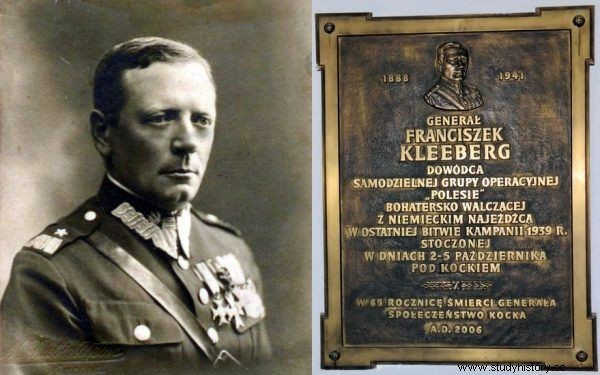
The creator of "Sword and Plow", Leon Poeplau, was a volunteer chaplain at Kleeberg. In the photo Franciszek Kleeberg (source:public domain), next to him is a commemorative plaque in his honor at the Anna Jabłonowska palace in Kock (photo:Jolanta Dyr, license CC BY-SA 3.0).
According to some historians, at this stage the organization had as many as 30,000 to 50,000 members. This is probably an exaggerated number. The counterintelligence of the Government Delegation in Warsaw claimed in a report from August 1943 that "MiP" gathered only 1.5 thousand people. people.
Mieczowcy created an extensive intelligence network. It was their intelligence (and not the Home Army's interview, as is commonly believed) that first discovered the German attempts with V-2 missiles carried out at the site in Peenemünde on the island of Usedom.
Resilience, expansion, grandeur
The ideology of the "Sword and the Plow" was based on a strong nationalism, however different from the traditional, endec approach. The nation was the most important value for Swordsmen, and the destiny of the Polish nation was size (in capital letters in the publications of the organization) . All effort was to be focused on achieving it. "Either the Poles will do their best [...], or two of our eternal enemies [...] will crush us and destroy us once and for all" - we read in one of the program articles.
The ongoing war with all its brutality was to be a chance for the revival of the nation:“This war should strip us of our indolence and immobility. We must finally end the passive, consumerist nature of our lives and endurance. This great cataclysm should awaken us to dynamic resilience, expansion and Greatness. "
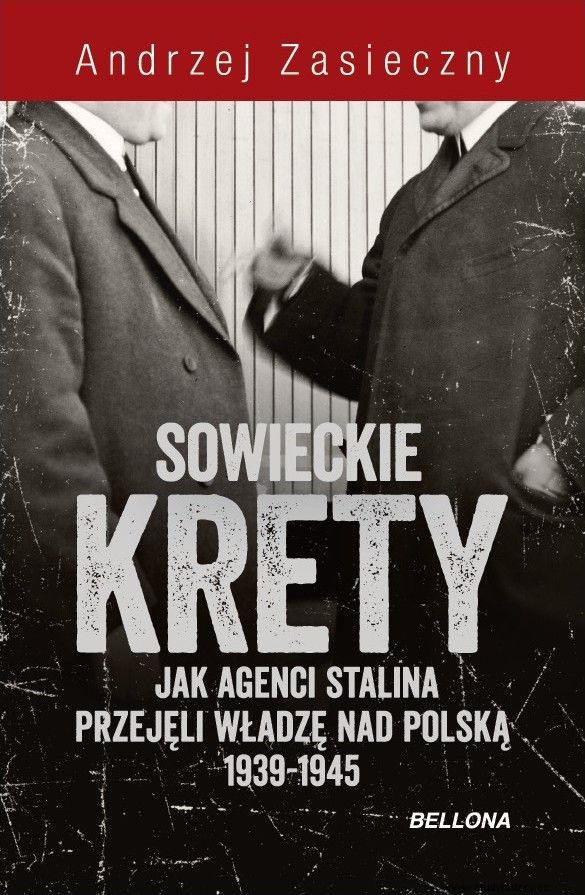
Remove the Jews from Poland
The second important element of the "Sword and Plow" ideology is anti-Semitism. Dr. Jarosław Tomasiewicz, a researcher of this organization, stated that the movement belonged to the underground organizations most hostile to Jews. The "Miecz i Pług" body wrote:"One of the essential points of our program [...] is the removal of Jews from Poland."
He also announced that: "with the Jewish problem, if Hitler does not prevent us (in a different way, which we do not approve of at all), [...] we will make order in Poland once and for all" . Mieczowcy even criticized the display of the Polish flag by the insurgents in the Warsaw Ghetto, claiming that it was funny, if not cynical …
We Slavs, we pagans
Although "Sword and Plow" referred to the Christian faith, paradoxically, in its ideological assumptions, there was a strong element of ... pagan. Like some extreme national groups today, the Swordsmen referred in ideological texts to "Slavic culture" and criticized Christianity and Rome.
In the magazines of "Miecza i Pług" one could read, for example:"The Polish nation is fed up with the dominance of foreign cultural influences over its native Slavic culture", "The Polish nation will revive its soul from vices and disabilities not from fear of sin or hell, [... ] not for religious reasons, but for tribal pride ", " Roman-Western culture has gone bankrupt, it turned out to be rot, falsehood and hypocrisy. Only our native Slavic culture has survived. ” In the poets' sword works, there were calls "Polish God!", "Slavic God!".
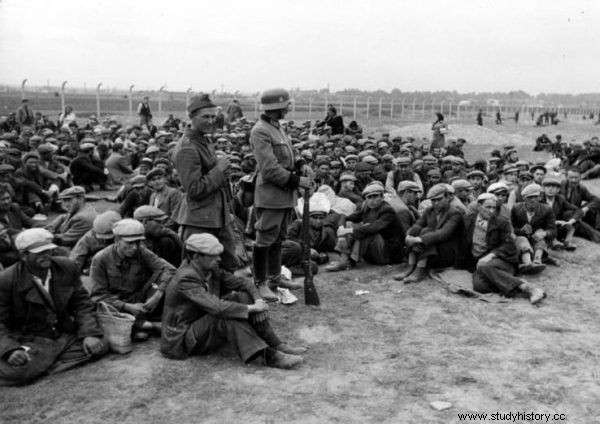
The leaders of Sword and Plow had nothing against the Holocaust. The photo shows the Jews guarded by the Germans in Kraków in 1939 (photo:Bundesarchiv, Bild 121-0295, license CC-BY-SA 3.0).
Poland from sea to sea
Swordsmen's views on the political and territorial situation of Poland after the obviously victorious end of the war were particularly bizarre. Here our country was to become a real European power.
The borders in the west and north were to be based on the Baltic Sea, Odra and Nysa Łużycka, encompassing Łużyce, Silesia, Pomerania, East Prussia and Gdańsk. In the south, the border was to be based on the Sudetes and the Carpathians. In the east, thanks to the union with Lithuania and Latvia, Belarus and Ukraine, the Republic of Poland was to reach as far as Smolensk and the Black Sea.
Poland was also supposed to be a colonial power, because "colonies are the honor of the nation and the heart of the Polish state" . Mieczowcy demanded for Poland, inter alia, Cameroon, Tanganyika and Madagascar, but judging from the importance attached to this issue in ideological texts, it was only the beginning of a long list of future Polish colonies.
The Slavic Empire
So located Poland was to become the center of the Slavic empire in Europe. It was to include "historically and ethnographically Slavic lands where the foot of a Slav ever stood".
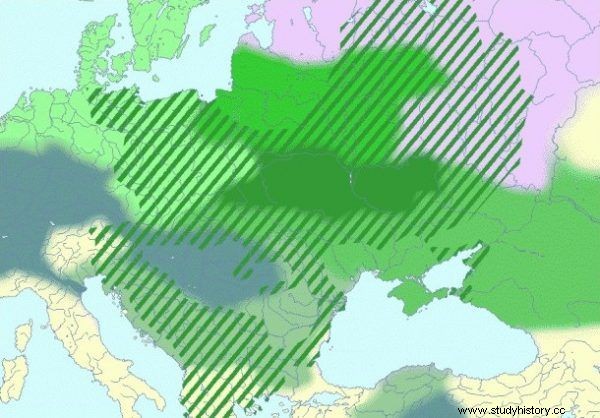
The Slavic empire was to include "historically and ethnographically Slavic lands where the foot of a Slav ever stood". On the map, the (hypothetical) cradle of the Slavs is marked with a dark green color, and with stripes of the same color - their expansion in the first millennium AD (source:Wikimedia Commons, Public Domain).
This meant that it will include the areas lying between the Baltic Sea and the Black Sea, and the Balkans. The Slavic peoples living there were to create "a federal state within which each Slavic group would have free cultural and national social development."
Interestingly, the sword ideologists emphasized that Poland should play the main role in the empire, but God forbid, it should not be a centralist and homogeneous state, dominated by the Polish nation. The Swordists even took steps to implement this fanciful geopolitical concept. They established contacts with Hungarians, Serbs, Slovaks, Ukrainians and Belarusians, as well as ... the communist Greek underground.
Contacts with the Ukrainians were particularly important to them. In 1943, they were supposed to conclude an agreement with the Organization of Ukrainian Nationalists, but the talks were terminated, allegedly due to the fault of the Polish side.

Surprisingly, the ideas of ... the London government had very similar ideas. His territorial program, expressed in a study from 1941 entitled "For a new order of things", contained the thesis that after the war one should enter a federation with Czechoslovakia, and looser ties with Lithuania, Hungary and Romania. In this way, Poland was to take over the leadership role in the intersea area.
On January 23, 1942, the Polish-Czechoslovak Confederation Agreement was even signed. Due to the progress of hostilities and the marginalization of the role of the emigration authorities, these plans never came to fruition.
With Germany and Japan against the Bolsheviks
Swordsmen considered Bolshevism to be the greatest threat to Poland, and the fight against it was the most important duty of Poles. Hence, they considered the signing of the Sikorski-Majski pact almost a treason. For some time, Słowikowski and Grad were looking for contact with the Germans to offer them their participation in the "European anti-Bolshevik crusade".
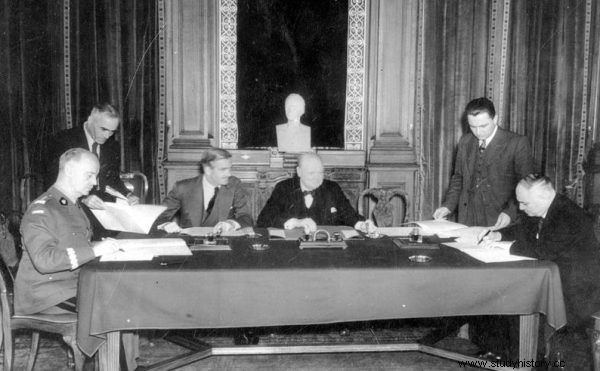
The Sikorski-Majski treaty was treated almost as an act of national treason. The photo shows the signatories of the pact:Sikorski, Eden, Churchill and Majski (source:public domain).
They managed to get such contact, which resulted in a certain tolerance of the organization by the Gestapo. The arrested members of "Miecz i Pług" were released after the interventions of Słowikowski and Grad, and the former could freely travel around Europe, incl. to Switzerland and Spain.
In 1943, the leaders of the organization issued a memorial to Adolf Hitler, in which, in a humble form, calling him "Excellency", they made a proposal to create, alongside Germany, a Polish army to fight Bolshevism. In return, they expected the administration in the General Government to be handed over to Polish hands and the terror to cease.
The second memorial was handed over by Słowikowski and Grad to the Japanese ambassador in Berlin. There, they offered Japan their cooperation against the Bolsheviks.
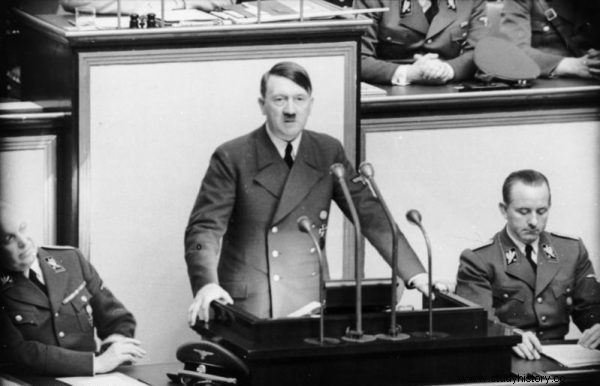
“Excellency” Adolf Hitler even received from the Swordsmen a proposal to create a Polish army in the Wehrmacht to fight the communists. The photo shows the Führer speaking in the Reichstag on May 4, 1941 (Bundesarchiv, Bild 101I-808-1238-05, license CC-BY-SA 3.0).
The Germans analyzed the offer and rejected it due to the low importance of "Sword and Plow" in the Polish underground. Most of the Polish underground regarded the contacts with Berlin as a betrayal.
As Andrzej Zasieczny writes in his book "Soviet Moles", the Soviet agent Bogusław Hrynkiewicz, active in "Miecz i Pług", at the beginning of September 1943 presented a group of "MiP" activists with documents proving the betrayal of Słowikowski and Grad. The organization decided to liquidate them without a trial before the underground court.
The sentence was carried out on September 18, 1943 in Warsaw - the "MiP" special platoon shot Grad in the gate of the tenement house at ul. Wielka 24, and Słowikowskiego on ul. Wilcza 16. The Slavic empire was not established. At least not in the form that the Swordsmen assumed - because under Soviet authority.
